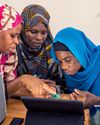
Her wipers pulsed at full speed as the green fields of Flanders turned a blurry grey. Behind her sat a small, black picnic cooler. Within 24 hours, it would be full of human brains - not modern specimens, but brains that had contemplated this landscape as far back as the middle ages and had, miraculously, remained intact.
For centuries, archaeologists have been perplexed by discoveries of ancient skeletons devoid of all soft tissue, except what MortonHayward cheerfully described as "just a brain rattling around in a skull". At Oxford, where she is a doctoral candidate, she has gathered the world's largest collection of ancient brains, some as old as 8,000 years. Additionally, after poring over centuries of scientific literature, she has tallied a staggering catalogue of cases - more than 4,400 preserved brains as old as 12,000 years. Using advanced technologies such as particle accelerators, she is leading a new effort to reveal the molecular secrets that have enabled some human brains to survive longer than Stonehenge or the Great Pyramid of Giza.
This research may unlock not just the past, but present-day mysteries, too. Morton-Hayward has suggested that the molecular processes that damage our brains in life could help preserve them after death a revelation that may reshape our understanding of ageing and neurodegenerative conditions.
On that stormy day, Morton-Hayward had embarked on an expedition to collect 37 brains recently excavated from a medieval graveyard in Belgium. She radiated empathy and good humour as she chatted about slicing up cerebral matter.
This story is from the November 01, 2024 edition of The Guardian Weekly.
Start your 7-day Magzter GOLD free trial to access thousands of curated premium stories, and 9,000+ magazines and newspapers.
Already a subscriber ? Sign In
This story is from the November 01, 2024 edition of The Guardian Weekly.
Start your 7-day Magzter GOLD free trial to access thousands of curated premium stories, and 9,000+ magazines and newspapers.
Already a subscriber? Sign In

Power play The Solar Mamas who are lighting up Zanzibar
In a dimly lit corridor of a mudwalled house nestled among coconut trees, Sharifa Hussein stripped red and black cables, a screwdriver voltage tester balanced between her lips and rolls of cable lying by her feet.

Play it again and again
Spotify's Billions Club tracks the world's most popular songs, but many greats are nowhere to be found. What are the forces shaping pop's new canon?

David Lynch 1946 -2025
The maverick American surrealist film director sustained a successful mainstream career while also probing the bizarre, the radical and the experimental

Election fever grows ....but Trump is pulling the strings
The machinations of Elon Musk andthe returning US president loom large in minds of politicians and voters

International response America's allies hope for the best-but prepare for the worst
Western allies of the US are braced for the return of Donald Trump, still hoping for the best, but largely unprepared for what may prove to be a chaotic and disorientating worst.

Mood music
Listening to, or playing, the right song can soothe pain, lift depression and help treat conditions as diverse as Parkinson's, Alzheimer's, PTSD and back pain. Neuroscientist and bestselling author Daniel Levitin gives his musical recommendations for better health, drawing on his experience of helping his friend, the legendary songwriter Joni Mitchell.

Gaza's devastation The terrible price exacted by Israel for 7 October attack
Israel began bombing Gaza on 7 October 2023 after Hamas crossed the border, killed about 1,200 people and took 251 others hostage to Gaza.
North Koreans' capture sheds new light on war
The news was sensational.

Fragile truce An agreement is in place-if it will hold matter is another
The hours-long delay in implementing the Gaza ceasefire agreement last Sunday was not a good omen for a deal that many fear could be doomed to failure as it moves through its challenging three phases.

Why did LA's wildfires explode out of control?
Acombustible combination of factors laid the groundwork for disaster as the city struggled with catastrophic blazes